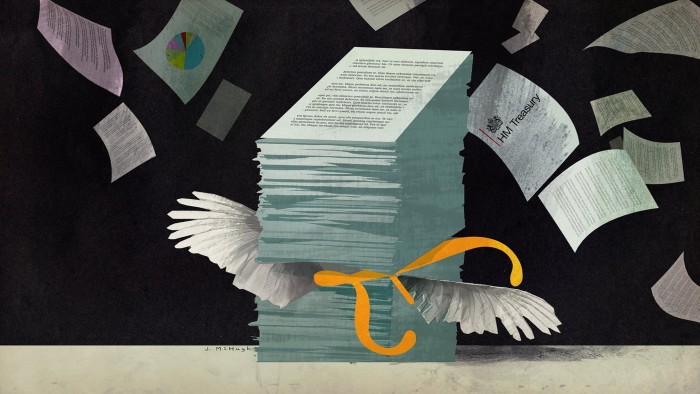Unlock the Editor’s Digest for free
Roula Khalaf, Editor of the FT, selects her favourite stories in this weekly newsletter.
Watching Rachel Reeves deliver her spending review, I once again felt I was being embraced by the rhetoric of Gordon Brown. The blizzard of figures bore all the hallmarks of Labour’s former chancellor and prime minister — some were presented in cash terms, others adjusted for inflation, one or two expressed as a proportion of GDP, a few compared payments over the next three years, some over five and some cumulated over many to arrive at a single enormous number.
As a political device designed to portray Reeves as a prudent Labour chancellor (but investing with a purpose), I am prepared to be convinced this is effective politics. But it is hopeless if you want to build an understanding of the choices Labour has made.
I also realised that the way I felt about the review depended on the particular hat I was wearing: as an economist looking at the numbers; as a school governor for the best part of 30 years who therefore plays a minor part in public service provision; or as a citizen who uses public services and pays tax.
The economist in me found the wall of figures irritating. An important skill is to be able to distinguish big from small, yet every part of Reeves’ speech sought to impede such analysis. It says something pretty bad about UK productivity that the nation relies on a chain of intermediaries to interpret the figures. Taxpayers pay the government to fund the independent Institute for Fiscal Studies via a public quango to inform us, the public, about public spending. The IFS itself said it was “baffled” by a speech that “did not appear to be a serious effort to provide any useful information to anybody”.
Cutting through the thicket, we find the spending numbers do tell a reasonably clear economic story. With real growth in day-to-day public service spending of 1.7 per cent between 2023-24 and 2028-29, this government is not presiding over austerity. But funding for public services will only rise at a similar pace to that seen under Boris Johnson and Rishi Sunak’s Tory governments.
The clear winner was the NHS, accounting for 40 per cent of all government day-to-day departmental spending. It will receive 90 per cent of all the real growth in such spending.
When it comes to capital spending, defence and net zero prevailed, highlighting Labour’s ambition to enhance security and the UK’s environmental credentials. If you listened to Reeves, however, you would have heard this spending would support “thousands of jobs” — building new nuclear power plants is a terribly expensive jobs programme.
If we are honest, public investment is not really about economic growth. The money spent will add to economic activity. But it would be unwise to think it will enhance UK productivity much, given its small size compared with the capital stock of the country. This is doubly true when ministers have decided to deprioritise value for money in overall project appraisal. Ministers have tweaked the Green Book to suggest that capital spending might still be worthwhile if the costs of a project exceed its benefits.
But when I listened with my public services hat on, the overwhelming takeaway from Reeves’ speech was, “I’ll believe it when I see it”. The gap between spending announcements in the Commons and a three-year school budget forecast is vast. Our school has been through both feast and famine, often only vaguely linked to national public spending trends. You adopt the attitude of a squirrel: holding back enough funding to ensure stability alongside an ability to respond to events.
In 2021, for example, the school welcomed Afghan refugees with high needs and little English. Extra funding was not attached. Money did eventually come through when the refugees had long since been rehoused in another part of the country. The reality of frontline provision really is that random.
How will this chancellor’s review affect the budget, I wondered, only to be faced with Orwellian newspeak in an official document. The Department for Education would be “supporting schools [to] find the first one percentage point of the teacher and support staff pay awards,” it said. In plain English, that means pay rises will not be fully funded and schools will need to decide who to lose, since pay is the vast majority of their budget.
Most of us approach spending announcements as citizens and thus have entirely different expectations from economists or public services providers. We simply want to know whether our encounters with the state — from bin collections to getting a passport to vital education and health needs — will exude quality and value for money.
Generally, we expect more from services than providers can offer at the price we want to pay for them, though we are quite happy for others to fork out. This is where the productivity improvements I find irksome as a provider are essential to me as a citizen. Had public sector productivity not fallen 4.6 per cent since 2019, better services would be possible without extra taxation.
The economist inside me knows that Reeves has political constraints. As a provider, I understand the need for efficiency. And as a citizen, I know I cannot expect others to fund the services I use. Yet I still find myself conflicted.
Many of us have similarly complex relationships with the state. Without a rapid and persistent improvement in Britain’s economic performance, no government we elect will have the resources to satisfy all our desires in the years ahead. Labour has its work cut out.





1 Comment
9j8hfn